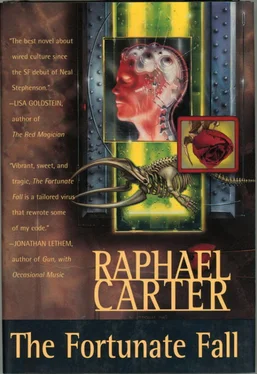Raphael Carter - The Fortunate Fall
Здесь есть возможность читать онлайн «Raphael Carter - The Fortunate Fall» весь текст электронной книги совершенно бесплатно (целиком полную версию без сокращений). В некоторых случаях можно слушать аудио, скачать через торрент в формате fb2 и присутствует краткое содержание. Город: New York, Год выпуска: 1996, ISBN: 1996, Издательство: Tor Books, Жанр: Киберпанк, на английском языке. Описание произведения, (предисловие) а так же отзывы посетителей доступны на портале библиотеки ЛибКат.
- Название:The Fortunate Fall
- Автор:
- Издательство:Tor Books
- Жанр:
- Год:1996
- Город:New York
- ISBN:0-312-86034-X
- Рейтинг книги:3 / 5. Голосов: 1
-
Избранное:Добавить в избранное
- Отзывы:
-
Ваша оценка:
- 60
- 1
- 2
- 3
- 4
- 5
The Fortunate Fall: краткое содержание, описание и аннотация
Предлагаем к чтению аннотацию, описание, краткое содержание или предисловие (зависит от того, что написал сам автор книги «The Fortunate Fall»). Если вы не нашли необходимую информацию о книге — напишите в комментариях, мы постараемся отыскать её.
“Gripping…. One of the most promising SF debuts in recent years”.
—“Publisher’s Weekly” starred review
The Fortunate Fall — читать онлайн бесплатно полную книгу (весь текст) целиком
Ниже представлен текст книги, разбитый по страницам. Система сохранения места последней прочитанной страницы, позволяет с удобством читать онлайн бесплатно книгу «The Fortunate Fall», без необходимости каждый раз заново искать на чём Вы остановились. Поставьте закладку, и сможете в любой момент перейти на страницу, на которой закончили чтение.
Интервал:
Закладка:
“As we approached the door to the next room, he chattered on with the hearty incomprehensibility of an auto mechanic, explaining how he had rebuilt my ruined mind. It was a simple idea, he said, and one he’d used before, though never (here he laughed) on such a scale. Really, you would almost think that Nature had intended it. The corpus callosum, the anterior commissure—why, they’re no more than a pair of cables; they link the right and left halves of the brain, just as you might link one computer to another. And they’re cables wide enough to merge two lobes into one self, so that if you could not dissect, you would not guess the halves were separate. And if you had a cable, well, why not a cable splitter? Could you not set up a cloverleaf among, not two, but four lobes? Would they not then be as intimate with each other as the two hemispheres of the brain are? Would they not merge into a single self?
“He was still talking as we passed through the doorway, and his voice droned on, uncomprehended, as I saw what we had come to. It was an enormous tank, brackish, encrusted with barnacles, and full of floating stems of cable cased in plastic. Then I caught a glimpse of the ‘computer’ that was now part of myself, and I no longer saw or heard him. The thing that lay suspended in that tank would not let even light escape from it, and no voice could out-shout its rasping breaths.”
I had been lulled by the scansion; now I snapped awake. “Wait a minute. Breaths? What are you saying—it was biological?”
He hesitated, then said in a sudden burst of nervous energy: “It was not ‘biological,’ it was alive; indeed, it is still alive; ‘it’ is a she; and “ she —” he paused, took a breath, grew calmer “—is a whale.”
“I see.” I leaned back in my chair, my wrist sockets clicking against the table. I never asked for this. All I ever wanted was a nice column in a print newspaper, a thousand words a week and a flattering mug shot, in which I could foist my every cockamamie opinion on a groggy audience for whom it was me or the cereal box. When Novaya Pravda folded I should have given up and gone into something less invasive and degrading, like, say, prostitution. But no, I had to retrain for an exciting career in the growing field of telepresence. Same job, new medium, I figured, but it’s not. In print news, your job is to know things about others; you peer out at the world through an arrow slit. In telepresence you are known. If I’d still been writing for a newspaper—if there still were newspapers— I could have forgotten Pavel Voskresenye and gone on. In telepresence the whole episode would be implicit in my broadcast, my gullibility stretched out for every imbecile to poke. I could only hope Keishi would manage to screen it all out.
Maybe, I thought, this would be the time that I’d finally quit. The doctors could fill my sockets in with something that wouldn’t be flesh, but would look a little like it, and I could emigrate to North America and never see anything more technologically advanced than a pitchfork. Except, of course (I had almost forgotten) that I was about to be arrested just for talking to this man. Maybe if I resisted arrest just right I could get myself shot.
“Hey, sorry, I was playing with the mix instead of listening,” Keishi said. “Are we having a low blood sugar moment or something?”
Actually, I subvoked, watching Voskresenye flag down the waiter for tea, with you here there’s one tiny redeeming feature to this mess. Let this be a lesson to you if you ever become a camera. This sort of thing can happen to you when you least expect it. Always be ready for it, ’cause I wasn’t, and I’m going to look like a real idiot.
“Wow, I guess I did miss something. Should I get it from your memories or do you want to tell me?”
It goes by different names, I said. We usually call it “being conned. ”
“Yeah? You think the old guy’s lying?”
Are you kidding, Keishi? A whale is as big as a — well, as a whale. They’re the metaphor for big. You can’t put a whale in a tank. It’s like claiming you slipcovered Leningrad. Especially if you’re a fugitive from the Postcops. How exactly do you take a whale on the lam, shove it in a briefcase and drag it past the metal detector? Not to mention the question of how Derzhavin got a whale in the first place. Remember that vid a few years back where they find a whale frozen in an iceberg, and they thaw it out and clone it and repopulate the oceans? Don’t you think that was a little improbable? And Voskresenye claims that a whale has survived all this time, not in the Antarctic ice, but in his basement. Yeah, I’d say I’m a little skeptical. Fair warning, Keishi: don’t count on getting any sleep the rest of this week. We’re going to be scrambling to finish this story without him.
“Maya, don’t you think you should at least give him a chance? He’s obviously been modified by the Guardians in some way. That carapace is pretty convincing.”
He may not be lying about that part, but with the whale there’s just no way. — Wait. If he’s lying about the whale, why should I think he wasn’t lying about everything else? My God. I laughed with relief. “ Stand a little to the left, please; spy satellites, you know.” I can’t believe I bought it. No, this is definitely a scam. Ten to one we find out he wrote that police report himself. All of which means that I’m not drinking tea after all.
“You’re jumping to conclusions,” she said sternly.
Look, Mirabara, I’ve been a camera for about as long as you’ve been multicellular, and every instant of that experience tells me that this man is not for real. I’m going to try to find out why he’s doing this. Meanwhile, you put together some contingency plans, OK? See if you can find me another interview.
“All right, but I still say—no, never mind, I’m going.”
Since I no longer had to worry how any of this looked on disk, I might as well satisfy my hunger. I took a bite of sandwich and said with my mouth full, “So, what kind of whale is it exactly?”
Voskresenye looked up from his teacup, which he had been staring into as if trying to read a message in the leaves. “Oh, come now, Andreyeva. Don’t humor me. Ask what you really want to ask.”
“All right, then. Instead of pouring water in your socket, why didn’t you just signal the mother ship to pick you up?”
He rubbed the bridge of his nose exhaustedly. “This bubble shows signs of degrading, and I can only go so long without recharging my exoskeleton, so I have no time for games. This will demonstrate the truth of what I say.” He set a vial of red fluid on the table.
“What’s that?”
“A blood sample.”
“Yours?”
“No. The whale’s.”
“Yeah. Whatever. Listen, you wouldn’t happen to have an overwhelming desire to tell me why you’re doing this, would—will you stop that?” He was chorusing every word I said, with no perceptible delay. “You don’t really think you can make me believe you with a parlor trick, do you?”
“Of course not; I would not so insult your intelligence. Good day, Andreyeva.” He stood abruptly and began to leave. Then, just before he reached the sidewalk, he turned and said pensively, “Consider this, however. If it is true… well, it’s the story of the year, isn’t it? To let someone else get it would indeed be a shame.” He shrugged slightly and vanished into the crowd.
I paid the bill and started to leave.
“You forgot the blood,” Keishi said.
What’s the point? It’s not whale. There’s no point checking. It’s just not.
Читать дальшеИнтервал:
Закладка:
Похожие книги на «The Fortunate Fall»
Представляем Вашему вниманию похожие книги на «The Fortunate Fall» списком для выбора. Мы отобрали схожую по названию и смыслу литературу в надежде предоставить читателям больше вариантов отыскать новые, интересные, ещё непрочитанные произведения.
Обсуждение, отзывы о книге «The Fortunate Fall» и просто собственные мнения читателей. Оставьте ваши комментарии, напишите, что Вы думаете о произведении, его смысле или главных героях. Укажите что конкретно понравилось, а что нет, и почему Вы так считаете.












